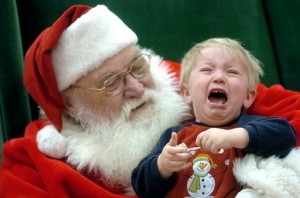{Taking a business blogging break this week for a little holiday fun.}
This holiday thing is intense. I was reading the other day that people started really getting into celebrating Christmas around 354 A.D. So, we made it from 354 until about 1954 before things really became so commercial. It took 1600 years for capitalism to take hold, but when it did, WOW! I’m not exactly sure what a Christmas recession looks like in other countries, but in the United States, we seem to still buy everything; we just try to get it on sale.
So, in the spirit of holiday capitalism, I went to the mall today with three of the little kids; the six, four, and almost two year old. We went there to see Santa Claus, or, as their mom called him, “The Big Cheese.” When she called Santa that, there was a three kid pause, and finally, the four year old said, “Cheese?” Who is the “Big Cheese?” “Santa,” her mom said, “Santa Claus is the Big Cheese.” Nina said, “Why is he cheese? I thought he was Santa.” By then mom realized that it was not good to confuse little kids about elves, magical people, and such because it was already confusing enough.

Photo Credit: AP
The day’s plan was simple: get their picture taken with Santa. We needed Annie Sullivan, Helen Keller’s teacher to pull off that miracle. The oldest one with two missing front teeth, played with everything in the garage before agreeing to be strapped into his seat, and the baby somehow flipped the lining of her seat and buried the belt latches. Only the four year old, who was wearing her Christmas dress, sliver dancing shoes, and holiday hair ribbon climbed into her seat and said, “Let’s go see Santa.” Not unlike her three year old cousin, Lucy, who spent hours under the Christmas tree staring mesmerized up into the lights and decorations, Nina was completely into it all.
When we arrived at Santa’s workshop, we watched a string of tiny kids panicking on the ole boy’s lap. The two year old was no different. Nothing helped. Squeaking reindeer toys, binkies and funny faces, were all in vain as she screamed in the arms of this strange, red suited man. After the trauma, we bought their Christmas picture. It had one terrified baby and two older kids looking off into space as if a hypnotic alien was on top of the camera. It could have been a scene from “Transformers 2: Revenge of the Fallen.”
During lunch we discovered that Santa had known exactly what the middle child wanted for Christmas, and that he had even discussed the particulars with her in detail. The magic continued. It was also during this meal that we had a very serious reindeer discussion. The boy’s mother looked at me and said, “Ask your grandson to name the reindeer that pull Santa’s sleigh.” So, I did just that. To which he replied, “Well, Poppa, you see, there’s Dasher and Dancer and Prancer and Vixen, Comet, Cupid, Donner and Blitzen plus Rudolph and Olive.” “Olive?,” I said out loud. “Yes,” he replied strongly, “Olive the other reindeer …used to laugh and call him names.” The absolute truth about the reindeer is that Dunder and Blixem, Dutch words for Thunder and Lightning, had their names changed to Donner and Blitzen several years ago for better song rhyming. (Another list of reindeer names that I saw included: Fireboy, Leroy, Pablo and Clarice, so Olive worked for me.)
In fact, this week I got another E-mail describing a third grader who was reading a story in class when he yelled out, “Mr. Markle, what’s a frickin’ elephant?” The teacher walked quickly over to the student’s desk to assure him that he was incorrect when he saw that the boy was reading a story about an “A-frican elephant.”? He was obviously Hooked on Phonics. So, “Ho, Ho, Ho, Merry Christmas to all and to all a good night.”






